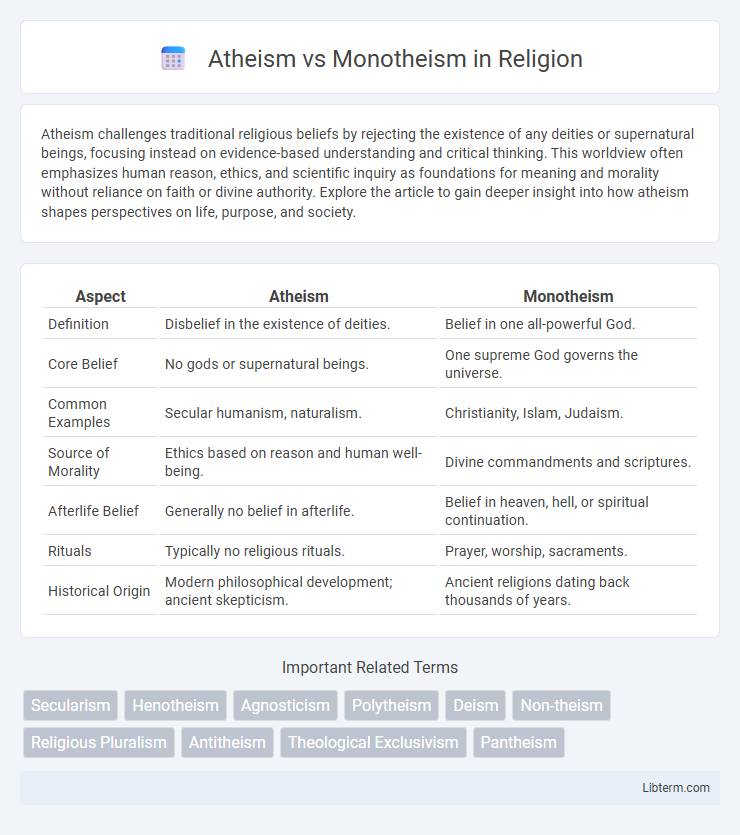Atheism challenges traditional religious beliefs by rejecting the existence of any deities or supernatural beings, focusing instead on evidence-based understanding and critical thinking. This worldview often emphasizes human reason, ethics, and scientific inquiry as foundations for meaning and morality without reliance on faith or divine authority. Explore the article to gain deeper insight into how atheism shapes perspectives on life, purpose, and society.
Table of Comparison
| Aspect | Atheism | Monotheism |
|---|---|---|
| Definition | Disbelief in the existence of deities. | Belief in one all-powerful God. |
| Core Belief | No gods or supernatural beings. | One supreme God governs the universe. |
| Common Examples | Secular humanism, naturalism. | Christianity, Islam, Judaism. |
| Source of Morality | Ethics based on reason and human well-being. | Divine commandments and scriptures. |
| Afterlife Belief | Generally no belief in afterlife. | Belief in heaven, hell, or spiritual continuation. |
| Rituals | Typically no religious rituals. | Prayer, worship, sacraments. |
| Historical Origin | Modern philosophical development; ancient skepticism. | Ancient religions dating back thousands of years. |
Defining Atheism and Monotheism
Atheism is defined by the absence of belief in any deities, emphasizing a worldview that rejects the existence of gods due to lack of empirical evidence or faith. Monotheism centers on the belief in a single, all-powerful deity, common in religions such as Christianity, Islam, and Judaism, where God is often seen as the creator and sustainer of the universe. The distinction between atheism and monotheism highlights fundamental differences in metaphysical and existential perspectives regarding divinity and the nature of existence.
Historical Origins of Atheism
Atheism's historical origins trace back to ancient civilizations such as Greece and India, where early philosophers like Democritus and Carvaka challenged traditional theistic beliefs through rational inquiry and skepticism. Unlike monotheism, which emerged prominently with religions like Judaism around 2000 BCE, emphasizing belief in a single, supreme deity, atheism developed as a non-theistic perspective rejecting gods altogether. Over centuries, atheism evolved from philosophical discourse into a more defined secular worldview during the Enlightenment, opposing religious dogma and promoting scientific reasoning.
The Rise of Monotheistic Religions
The rise of monotheistic religions such as Judaism, Christianity, and Islam marked a significant shift from earlier polytheistic and atheistic beliefs, emphasizing the worship of a single, all-powerful deity. These faiths introduced structured doctrines and ethical systems that influenced legal and social frameworks across civilizations. The unifying concept of one God fostered communal identity and helped solidify cultural and political power throughout history.
Core Beliefs and Worldviews
Atheism centers on the absence of belief in deities, emphasizing empirical evidence and skepticism towards supernatural claims, often aligning with secular humanism and naturalism. Monotheism asserts the existence of a single, omnipotent God who governs the universe, providing moral frameworks and purpose through sacred texts such as the Bible, Quran, or Torah. These contrasting worldviews shape ethical systems, rituals, and interpretations of existence, influencing cultural norms and individual behavior.
Arguments for Atheism
Atheism relies on empirical evidence and scientific reasoning, questioning the lack of observable proof for any deity's existence. It emphasizes the problem of evil and inconsistencies in religious texts as arguments against monotheistic claims. Atheists often argue that natural explanations for the universe's origin and complexity reduce the necessity for a supernatural creator.
Arguments for Monotheism
Monotheism presents arguments centered on the existence of a single, omnipotent, and omniscient deity as the ultimate cause and moral foundation of the universe. The cosmological argument posits that the universe's existence requires a first cause, identified as God, while the teleological argument highlights complex natural order and design as evidence of intelligent creation. Moral arguments assert that objective moral values are best explained through the existence of a monotheistic God who grounds ethical standards beyond subjective human preferences.
Ethical Frameworks and Morality
Atheism derives ethical frameworks primarily from secular humanism, emphasizing reason, empathy, and social well-being without reliance on divine authority, while monotheism bases morality on divine commandments and religious doctrines that define absolute moral standards. Ethical frameworks in monotheistic systems often promote accountability to a higher power, motivating adherence to moral laws through concepts of reward and punishment in an afterlife. In contrast, atheistic morality centers on human responsibility, promoting ethical behavior through rational evaluation and social contracts rather than theological mandates.
Comparative Influence on Society
Atheism challenges traditional religious frameworks by promoting secularism and scientific reasoning, influencing societal views on morality and ethics without reliance on divine authority. Monotheism provides a unified belief system centered on one deity, shaping cultural norms, laws, and community cohesion through shared religious values. The interplay of these perspectives affects educational policies, legal systems, and social unity, highlighting their distinct roles in shaping societal structures.
Modern Debates and Perspectives
Contemporary debates between atheism and monotheism center on the epistemological foundations of belief and the role of religion in public life, emphasizing scientific inquiry and secular ethics versus faith-based morality. Prominent atheists challenge monotheistic claims through arguments rooted in empirical evidence and skepticism, while proponents of monotheism advocate for the existential and cultural significance of a singular divine entity. Discussions increasingly engage with pluralism, religious identity, and the impact of digital media on shaping modern spiritual discourse.
Future Trends: Atheism vs Monotheism
Future trends indicate a continued rise in atheism in Western societies, driven by increasing secularization, scientific advancements, and shifting cultural values that emphasize rationalism and individualism. Monotheism, while maintaining significant global influence through major religions like Christianity, Islam, and Judaism, faces challenges as younger generations in urbanized areas often prioritize personal spirituality over institutionalized faith. Demographic changes, education levels, and technological impacts on information dissemination will play critical roles in shaping the evolving landscape between atheism and monotheism.
Atheism Infographic

 libterm.com
libterm.com